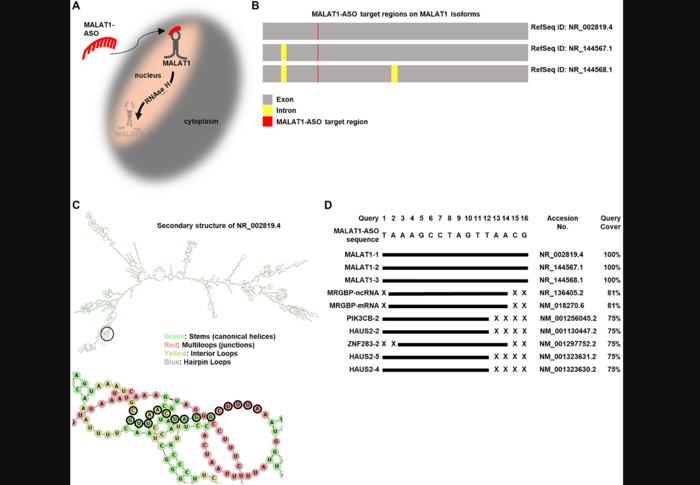“In this study, we present novel transcriptional dependencies between MALAT1 and MAPK-pathway-associated genes in melanoma.”

Credit: 2023 Feichtenschlager et al.
“In this study, we present novel transcriptional dependencies between MALAT1 and MAPK-pathway-associated genes in melanoma.”
BUFFALO, NY- May 30, 2023 – A new research paper was published in Oncotarget’s Volume 14 on May 26, 2023, entitled, “Deconstructing the role of MALAT1 in MAPK-signaling in melanoma: insights from antisense oligonucleotide treatment.”
The long non-coding RNA (lncRNA) MALAT1 is a regulator of oncogenesis and cancer progression. MAPK-pathway upregulation is the main event in the development and progression of human cancer, including melanoma and recent studies have shown that MALAT1 has a significant impact on the regulation of gene and protein expression in the MAPK pathway. However, the role of MALAT1 in regulation of gene and protein expression of the MAPK-pathway kinases RAS, RAF, MEK, and ERK in melanoma is largely unknown.
In this study, researchers Valentin Feichtenschlager, Yixuan James Zheng, Wilson Ho, Linan Chen, Ciara Callanan, Christopher Chen, Albert Lee, Jose Ortiz, Klemens Rappersberger, and Susana Ortiz-Urda from the University of California San Francisco and Medical University Vienna demonstrated the impacts of antisense oligonucleotide (ASO)-based MALAT1-inhibition on MAPK-pathway gene regulation in melanoma.
“Our results showed that MALAT1-ASO treatment decreased BRAF RNA expression and protein levels, and MALAT1 had increased correlation with MAPK-pathway associated genes in melanoma patient samples compared to healthy skin.”
Additionally, drug-induced MAPK inhibition upregulated MALAT1-expression, a finding that resonates with a paradigm of MALAT1-expression presented in this work: MALAT1 is downregulated in melanoma and other cancer types in which MALAT1 seems to be associated with MAPK-signaling, while MALAT1-ASO treatment strongly reduced the growth of melanoma cell lines, even in cases of resistance to MEK inhibition. MALAT1-ASO treatment significantly inhibited colony formation in vitro and reduced tumor growth in an NRAS-mutant melanoma xenograft mouse model in vivo, while showing no aberrant toxic side effects.
“Our findings demonstrate new insights into MALAT1-mediated MAPK-pathway gene regulation and a paradigm of MALAT1 expression in MAPK-signaling-dependent cancer types. MALAT1 maintains essential oncogenic functions, despite being downregulated.”
Read the full paper: DOI: https://doi.org/10.18632/oncotarget.28447
Correspondence to: Valentin Feichtenschlager
Email: [email protected]
Keywords: MALAT1, MAPK-pathway, BRAF, melanoma, antisense oligonucleotides
About Oncotarget: Oncotarget (a primarily oncology-focused, peer-reviewed, open access journal) aims to maximize research impact through insightful peer-review; eliminate borders between specialties by linking different fields of oncology, cancer research and biomedical sciences; and foster application of basic and clinical science.
To learn more about Oncotarget, visit Oncotarget.com and connect with us on social media:
- YouTube
- LabTube
- Soundcloud
Click here to subscribe to Oncotarget publication updates.
For media inquiries, please contact: [email protected].
Oncotarget Journal Office
6666 East Quaker Str., Suite 1A
Orchard Park, NY 14127
Phone: 1-800-922-0957 (option 2)
###
Journal
Oncotarget
DOI
10.18632/oncotarget.28447
Method of Research
Observational study
Subject of Research
Human tissue samples
Article Title
Deconstructing the role of MALAT1 in MAPK-signaling in melanoma: insights from antisense oligonucleotide treatment
Article Publication Date
26-May-2023



